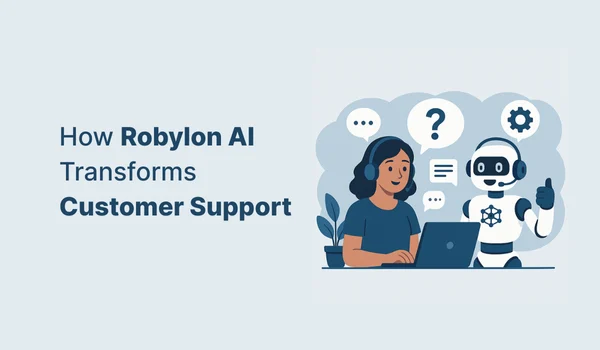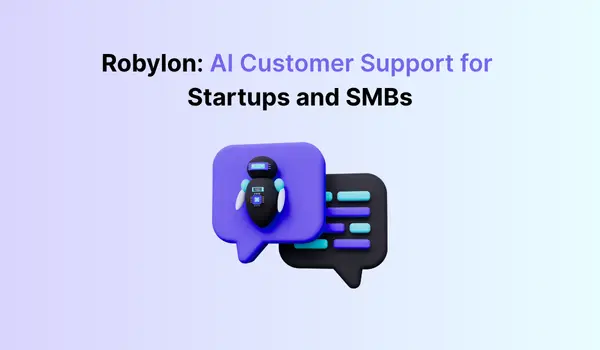TL;DR
If you are looking to replace Chatbase with a more powerful AI chatbot platform, there are several great options in 2025. Explore these alternatives based on your specific needs, integrations, and scalability.
- Robylon AI: Best for omnichannel AI support across chat, voice, email, and tickets with advanced workflow automation.
- Botpress: Ideal for developers who want full control over chatbot logic, hosting, and integrations with open-source flexibility.
- Voiceflow: Best for design-led teams building complex, multi-turn conversational flows for chat and voice interfaces.
- Tidio: Focuses on SMBs and e-commerce with a hybrid platform combining live chat, AI chatbots, and helpdesk functionality.
- Intercom Fin: A powerful AI agent for SaaS and enterprise support, handling complex queries and multilingual capabilities.
- Drift: Conversational AI for B2B sales teams, automating lead qualification and enhancing customer engagement.
- Chatfuel: A no-code platform mainly for automating conversations on Facebook Messenger, WhatsApp, and Instagram.
- Yuma AI: A Shopify-focused AI assistant for automating e-commerce support and ticket management.
- Fini: No-code chatbot transforming knowledge bases into interactive self-serve Q&A systems.
- Ingest AI: A no-code platform for building knowledge-based chatbots from websites, documents, and internal content.
Introduction
Are you exploring Chatbase alternatives to enhance your customer support automation? Whether you are managing e-commerce, SaaS, or fintech, finding the right AI chatbot platform can significantly streamline operations and boost user satisfaction. While Chatbase is known for its no-code chatbots, several other tools in 2025 offer more advanced features, including multilingual support, omnichannel coverage, and autonomous AI agents. This guide highlights the best Chatbase competitors, helping you make an informed choice for your business.
See your Chatbase use cases run end to end, book a demo.
What is Chatbase?
Chatbase is an AI chatbot builder that lets teams train custom AI chatbots on their own data and deploy them on a website widget. Many users pair it with popular LLM models and simple content sources to get fast AI-powered customer support.
What does it help with?
- Configure a no-code chatbot with branding and a base prompt.
- Quick training on your content: Upload pages, PDFs, or text and get a working AI chatbot fast
- Basic flows and a website widget: Add a custom AI chatbot to your site with a name, icon, and welcome copy
When to consider alternatives
While Chatbase is a popular no-code chatbot builder, many businesses face friction that makes it worth exploring alternatives to Chatbase
- Need deep integrations with CRM, help desks, and internal systems.
- Omnichannel coverage across web, WhatsApp, voice, email, and social.
- Plan to run agent actions and workflows that change data, not just answer questions.
- Require enterprise governance, SSO, and audit trails.
- Companies often need separate chatbots for internal teams, customers, and public sites. Chatbase does not support this.
- Without advanced workflows, Chatbase functions more like a Q&A tool than a true AI agent
Instead of accepting the gaps, many businesses benefit from switching to the top Chatbase alternatives that deliver personalization, omnichannel chatbot automation, and measurable ROI.
Common drawbacks of Chatbase
- Limited depth of integrations: Hard to sync CRM/help desk objects (tickets, orders, profiles) end-to-end
- Q&A bias over actions: Strong at answering, lighter on workflows (refunds, updates, authenticated steps)
- Omnichannel gaps: Website widget first; weaker WhatsApp, email, voice, social continuity in one timeline
- Enterprise controls: SSO, roles, audit trails, and PII policies feel basic for regulated teams
- Analytics for ROI: Sparse links between deflection, FCR, CSAT, and AHT for clear business impact
- KB customization: Difficult to customize the knowledge base (rules, tone packs, policy prompts, versioning) at scale
- Pricing: Expensive compared to similar platforms, with value constrained by lighter automation
Methodology for Selecting the Best Chatbase Alternatives
Before finalizing a Chatbase alternative, define what matters most for your team. Focus on platforms that deliver measurable impact, not just conversational capabilities.
- Easy setup and intuitive interface – Choose a platform that installs quickly, with a clean dashboard for managing chats, tickets, and AI workflows without complexity.
- Strong automation and AI capabilities – Look for NLP/NLU-powered AI agents that handle common queries, pre-fill forms, route tasks, and trigger workflows with minimal human intervention.
- Rich integrations – Ensure seamless connections with CRM, help desk systems, analytics tools, payment gateways, and other internal platforms to unify data and reduce operational friction.
- Deep customization – Customize chat widgets, colors, positioning, and language. Support white-label knowledge bases and tailor automation logic per channel to align with your brand.
- Transparent pricing and scalability – Pick platforms with clear plans, avoid hidden costs, and ensure pricing scales with usage, bots, and added channels.
- Omnichannel support – Deliver consistent experiences across web chat, WhatsApp, email, SMS, and voice. Maintain shared context across channels and unified reporting for insights.
- Intelligent knowledge base control – Add custom rules to manage tone, accuracy, and response behavior. Ensure your AI agents follow company policies and maintain contextual consistency.
This framework ensures you select a Chatbase alternative that combines automation, customization, and measurable business value.
10 Best Chatbase Alternatives in 2025
1. Robylon

Robylon is an AI agent platform that automates customer conversations across chat, voice, WhatsApp, email, and tickets. It enables 80–90% automation for support and pre-sales.
Best Use Case: Best for businesses needing unified support and sales automation with advanced workflows, voice AI, and ticket integration.
Key Features
- AI chat agents for repetitive query resolution with multilingual replies.
- Native voice AI for inbound/outbound with contextual human handoff
- Omnichannel support: Web chat, WhatsApp, Instagram, Email, SMS, Voice; one shared timeline
- Advanced AI agents with Custom KB Instructions (policy, tone, escalation) and tool use
- Workflow automation for order lookups, refunds, bookings, and KYC with safe data actions and guardrails
- Unified inbox with linked ticketing, analytics, and sentiment detection
- Deep integrations with CRMs/help desks/data sources; authenticated actions and clean sync
- Full widget customization and brand controls (color, copy, placement)
Automation Notes: Robylon delivers autonomous AI agents that trigger workflows, escalate when needed, and proactively follow up with customers.
Pricing: Free; Starter $39/mo; Business $199/mo; Custom Enterprise plans available
Industry: Strong fit for e-commerce, SaaS, fintech, and marketplaces with omnichannel needs
Limitations: Requires short implementation and setup to map workflows, connect data, and integrate with CRMs or help desks.
Why Better than Chatbase?
Unlike Chatbase’s web-only widget, Robylon delivers omnichannel AI (Web, WhatsApp, Instagram, Email, Voice) with a unified inbox and linked ticketing, so every conversation stays in one timeline. Beyond Q&A, advanced AI agents run real workflows (order lookups, refunds, KYC), use Custom KB Instructions for policy-safe answers, and provide a clean human handoff. You get deeper integrations, multilingual coverage, and analytics that tie automation to CSAT, AHT, FCR, and deflection for measurable ROI.
2. Botpress
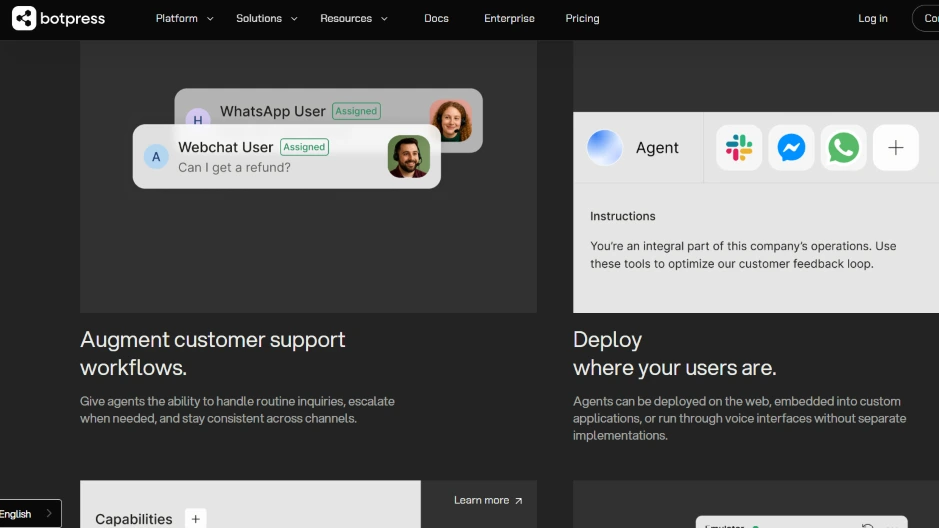
Botpress is an open-source chatbot development framework designed for technical teams that need control over data and workflows.
Best Use Case: Best for developer teams building custom, highly tailored bots with full control over hosting, logic, and integrations.
Key Features
- Open-source with modular architecture and plugin support
- On-premise or cloud hosting for privacy-focused deployments
- Visual flow editor combined with NLU/NLP engine
- Extensible through APIs and Node.js modules
Automation Notes: Automation depends on developer-built flows; Botpress provides deep flexibility, but not out-of-the-box autonomous actions
Pricing: Free community edition; Pro starts at $79/month; Enterprise from $445/month
Industry: Well-suited for enterprises needing data privacy, custom workflows, or regulated industry compliance
Limitations: Steep learning curve and technical overhead make it unsuitable for non-developers or teams needing rapid no-code deployment
Why Better than Chatbase?
Botpress provides deeper customization and hosting flexibility, unlike Chatbase’s limited widget, making it fit for enterprise-grade solutions.
3. Voiceflow
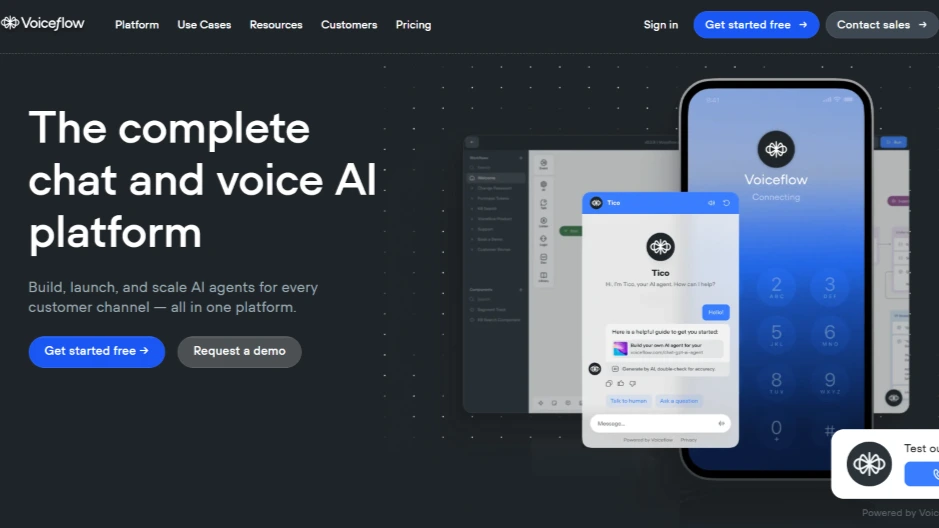
Voiceflow is a collaborative conversational AI design platform that allows teams to prototype, test, and deploy voice and chat agents.
Best Use Case: Ideal for design-led teams building complex conversational flows for customer support, IVR, and voice interfaces.
Key Features
- Drag-and-drop canvas for advanced conversation design
- Prototyping and user testing tools for rapid iteration
- Knowledge base integration with LLM tuning
- Scalable vector database to manage training data
Automation Notes: Voiceflow supports autonomous workflows through structured conversation logic, but human routing remains central for complex cases.
Pricing: Pro plan $60/editor/month; Team $125/editor/month (up to 5 editors); Enterprise pricing on request
Industry: Best suited for SaaS, telecom, and CX teams creating multi-turn, complex support journeys
Limitations: Lacks native support for messaging apps like WhatsApp and has limited analytics compared to full-stack platforms
Why Better than Chatbase?
Voiceflow enables complex, design-driven flows and testing, unlike Chatbase’s limited Q&A widget, making it better for advanced use cases.
4. Tidio
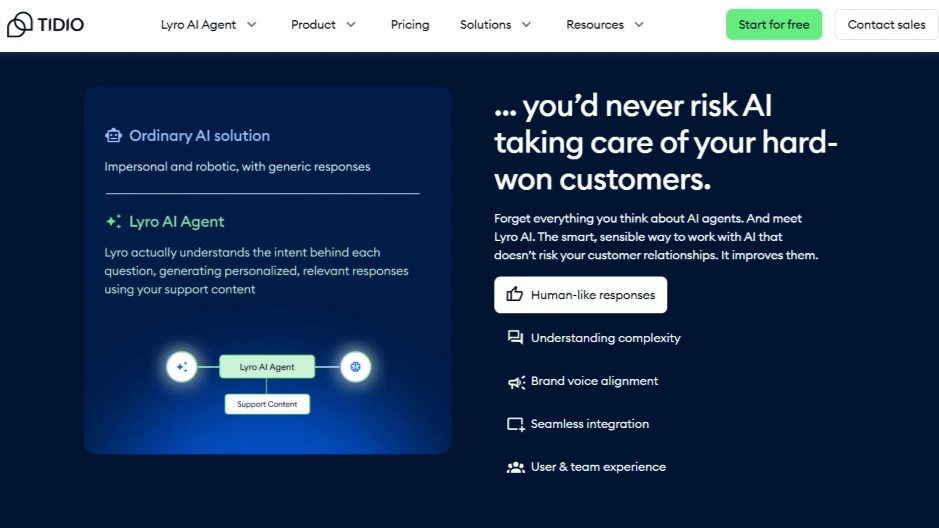
Tidio is a hybrid customer support platform combining live chat, AI chatbots, and help desk features in one interface.
Best Use Case: Best for SMB e-commerce sites needing a simple, action-oriented support bot with strong sales automation.
Key Features
- Lyro AI agent handles tasks like orders, lead qualification, and email replies
- Visual automation builder with 40+ e-commerce templates
- Unified inbox for chat, email, Instagram, Messenger, and WhatsApp
- Ticketing system with priorities and assignments
Automation Notes: Tidio automates sales and support through Lyro AI and visual flows, turning support channels into revenue drivers.
Pricing: Plans start at $32.50/month; higher tiers include automation templates and a multichannel inbox
Industry: Designed for e-commerce, Shopify, and SMBs, aiming to merge support with conversion
Limitations: Broad feature set creates a steeper learning curve and may overwhelm teams that only need a simple Q&A bot.
Why Better than Chatbase?
Tidio offers multichannel coverage, e-commerce integrations, and revenue-focused automation; Chatbase remains limited to static site Q&A.
5. Intercom Fin
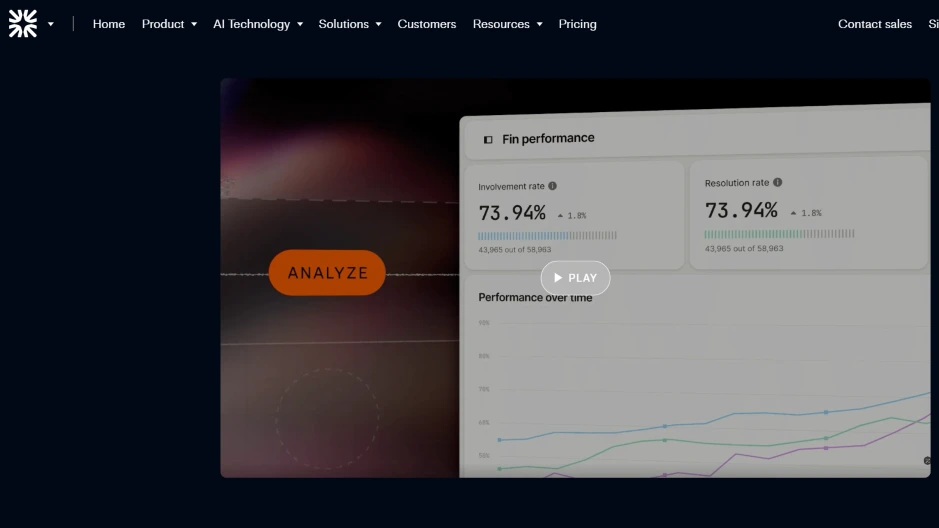
Intercom Fin is Intercom’s GPT-4-powered AI support agent designed to reduce workload by resolving up to 50% of queries.
Best Use Case: Best for SaaS or enterprise teams already using Intercom for customer support, onboarding, or product tours.
Key Features
- GPT-4 AI agent integrated with Intercom inbox
- Supports 43 languages for global deployment
- Connects with 400+ apps and CRMs
- Configurable multiple Fin agents for different use cases
Automation Notes: Fin resolves queries directly in-app and hands off seamlessly to human agents when escalation is needed.
Pricing: $0.99 per resolution; Starter plan from $74/month; Advanced $99/seat; Expert $139/seat
Industry Fit: Fits SaaS, enterprise, and tech teams relying heavily on the Intercom ecosystem
Limitations: Pricing per resolution grows quickly, and support for integrations and analytics is weaker compared to broader platforms.
Why Better than Chatbase?
Fin integrates natively into Intercom’s support suite, offering multilingual, scalable automation beyond Chatbase’s website-only Q&A.
6. Drift
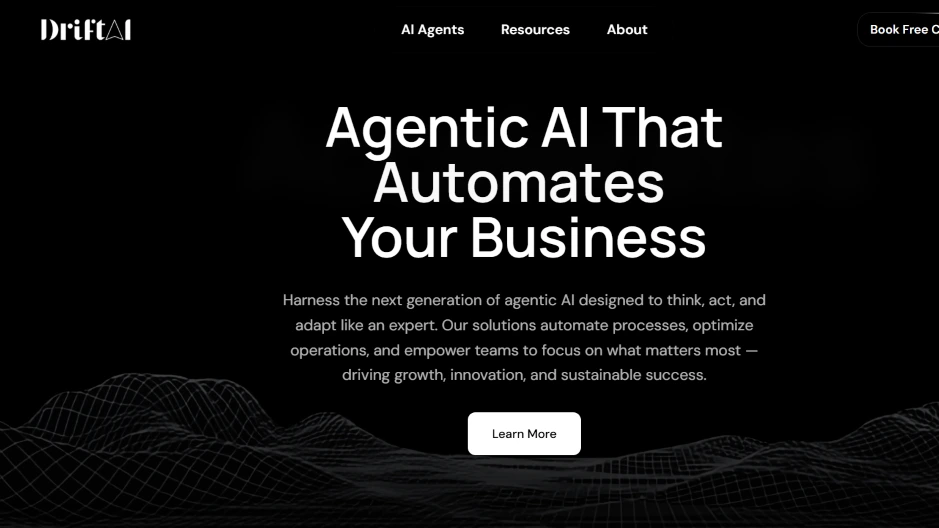
Drift is a conversational AI platform for B2B companies, focused on real-time buyer engagement and pipeline acceleration.
Best Use Case: Best for sales and marketing teams looking to qualify leads, book meetings, and accelerate deals directly from chat.
Key Features
- AI-powered chatbots for lead qualification and routing
- Real-time account identification for targeted engagement
- Deep CRM integrations with Salesforce, HubSpot, Marketo
- Multilingual chat support for global sales teams
Automation Notes: Drift automates sales workflows by pre-qualifying leads, scheduling demos, and syncing data with CRMs to reduce manual sales effort.
Pricing: Premium plans start at $2,500/month; enterprise pricing available on request
Industry: Tailored for B2B SaaS, enterprise sales, and marketing-driven companies
Limitations: High entry cost makes Drift inaccessible for SMBs, and it focuses narrowly on sales, not full customer support
Why Better than Chatbase?
Drift delivers sales-driven automation with CRM sync, whereas Chatbase is limited to static support bots without revenue workflows.
7. Chatfuel
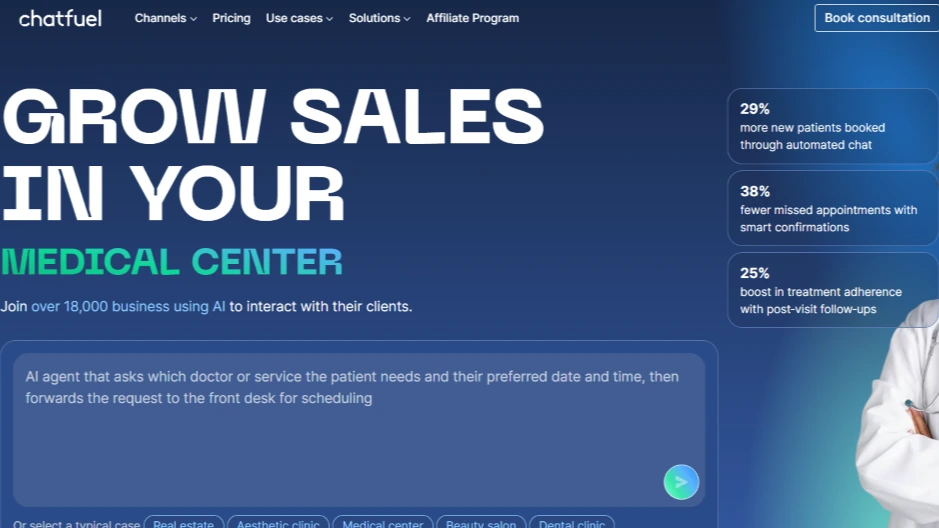
Chatfuel is a no-code chatbot builder originally built for Facebook Messenger, now supporting Instagram and WhatsApp.
Best Use Case: Best for businesses looking to automate social media conversations and drive sales through Messenger and WhatsApp.
Key Features
- Drag-and-drop builder for fast setup
- Cart recovery and product recommendation flows
- GDPR-compliant customer data handling
- Templates for e-commerce automation
Automation Notes: Chatfuel automates sales conversations, lead capture, and support FAQs within Facebook, Instagram, and WhatsApp channels.
Pricing: Plans start at $14.39/month for Facebook+Instagram and $41.29/month for WhatsApp; Enterprise custom pricing
Industry: Ideal for e-commerce, retail, and SMBs that rely on Meta platforms.
Limitations: Focused on the Meta ecosystem; lacks robust analytics, advanced AI, or multichannel support outside social messaging apps.
Why Better than Chatbase?
Chatfuel supports sales automation in WhatsApp and Instagram, while Chatbase limits users to web-only chatbot widgets.
8. Yuma AI
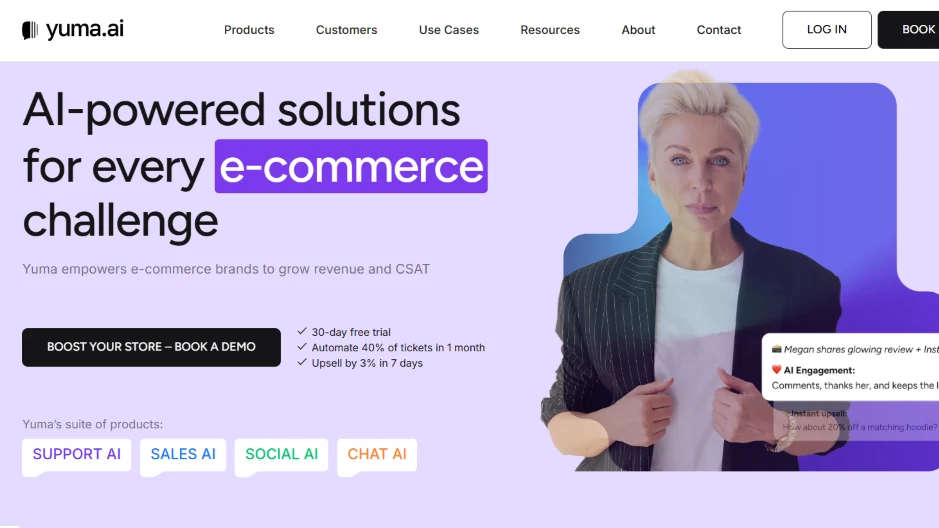
Yuma AI is a Shopify-focused AI support platform that integrates with help desks like Gorgias and Zendesk.
Best Use Case: Best for Shopify merchants aiming to reduce ticket load and automate repetitive e-commerce support queries.
Key Features
- AI ticket assistant drafting responses automatically
- Autopilot agents for subscription, orders, and refunds
- Integrations with Gorgias, Zendesk, and Shopify apps
- Multilingual support for global stores
Automation Notes: Yuma automates up to 50% of e-commerce tickets with AI-drafted responses and agent co-pilots.
Pricing: Starter plan from $299/month; 7-day free trial available
Industry: Purpose-built for Shopify merchants and e-commerce platforms
Limitations: Restricted to the Shopify ecosystem; not flexible for SaaS, fintech, or non-retail industries needing broad integrations.
Why Better than Chatbase?
Yuma resolves tickets directly in help desks, unlike Chatbase’s static widget, making it far stronger for e-commerce automation.
9. Fini

Fini is a no-code AI chatbot that transforms knowledge bases into interactive, self-serve Q&A chatbots.
Best Use Case: Best for companies wanting to extend their knowledge base into a conversational AI without a complex setup.
Key Features
- Converts KB articles into interactive chat responses
- Supports tone customization (20+ presets)
- Slack and Discord integrations
- Learns and evolves from customer feedback
Automation Notes: Fini automates FAQ resolution by pulling directly from knowledge bases and routing complex cases to humans.
Pricing: Free plan (50 questions/month); Paid plans from $0.096/question; Enterprise custom pricing
Industry: Best for SaaS, tech, and community-driven companies with rich knowledge bases
Limitations: Limited customization of flow design; struggles with highly technical or complex workflows outside static knowledge bases.
Why Better than Chatbase?
Fini automates KB answers with configurable tone and integrations, while Chatbase offers only basic document ingestion.
10. Ingest AI
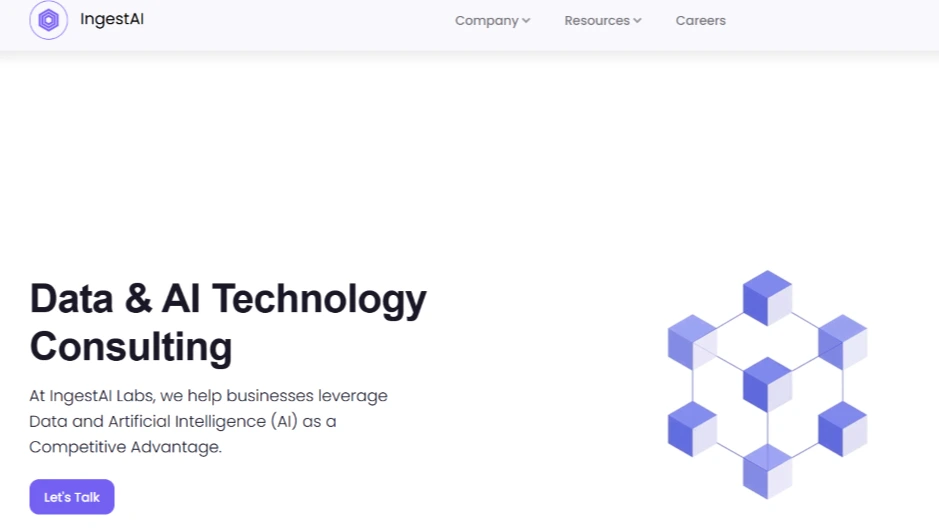
Ingest AI is a no-code platform that builds AI chatbots trained on websites, PDFs, and internal content.
Best Use Case: Best for SMBs needing quick setup of knowledge-based chatbots for support and internal queries.
Key Features
- AI training from multiple sources (docs, sites, files)
- Predefined prompt templates for tone and logic
- Webchat deployment and API integration
- Supports structured knowledge aggregation
Automation Notes: Ingest AI automates repetitive support queries by training bots on structured and unstructured business content.
Pricing: Starter $39/month, Pro $89/month, Business $480/month
Industry: Works well for small to mid-size businesses and internal support teams
Limitations: Does not support multiple bots per account and has limited integrations compared to broader chatbot platforms.
Why Better than Chatbase?
Ingest AI provides broader integrations and structured KB use, while Chatbase remains limited to simple PDF/web ingestion.
Top 10 Chatbase Alternatives of 2025 (Compared)
This table provides a snapshot of each tool's unique features and pricing, assisting you in selecting the most suitable Chatbase alternative for your needs.
Suitable tool based on use-case
Choosing a Chatbase alternative starts with your primary use case. Align tools to the work your team does most: post-purchase ops, onboarding, compliance, or revenue; then shortlist.
E-commerce
If you are evaluating Chatbase competitors for e-commerce, look for bots that handle the full post-purchase loop
- Order lookups, exchanges, returns, and delivery status updates
- Supporting automated refund processing
- WhatsApp notifications for shipping updates and offers
For merchants, the best Chatbase alternatives for e-commerce are Robylon, Tidio, and Yuma AI. These features turn AI-powered customer support into a driver of repeat sales. Start improving today by lifting conversions with a proven ecommerce playbook.
SaaS
A strong chatbot for SaaS reduces support friction and improves retention. For SaaS teams, the right chatbot should combine onboarding and account management
- Guided onboarding and in-app help
- Billing and subscription changes
- Account actions like password resets or plan upgrades
For product-led SaaS companies, the top Chatbase alternatives are Robylon, Intercom Fin, and Fini.
Fintech
Fintech firms need more than a simple bot. Look for a Chatbase alternative with integrations that support
- Automated KYC reminders
- Secure statement fetch
- Dispute and loan follow-up flows
- Multilingual support for regional markets
With AI-powered customer support, agents can meet compliance requirements and improve user trust. Fintech firms need automation with compliance. Best fits for Fintech include: Robylon AI (handles KYC reminders, multilingual support, and loan follow-ups with voice + WhatsApp + chat + social media) and Drift.
See real deployments and fintech-specific wins. Explore our guide on the leading AI customer service chatbot for fintech.
Support and Sales
The best platforms combine pre-sales and post-sales automation
- Lead capture, product fit discovery, and quotes
- Assisted checkout flows
- Follow up with a ticket if needed
This blended approach is where autonomous AI agents outperform basic chatbots.
If you want bots that cover the full lifecycle (lead → purchase → ticket): Robylon, Botsonic, and Drift.
No-Code vs. Developer Build
No-Code Chatbot Platform
If you want to ship fast, a no-code Chatbase alternative helps teams
- Manage content and FAQs
- Map common flows with visual builders
- Hand off to human agents when needed
Best for marketing, support, and operations teams that need agility. Top alternatives are Robylon, Botsonic, Tidio, and Chatfuel.
Developer-Led Build
Some businesses need advanced control, and a developer-led chatbot builder supports
- Custom tools and data actions
- Secure API calls and webhook workflows
- Complex logic tied to internal systems
Best for teams with engineering resources and regulated industries. For custom flows and Chatbase alternatives with integrations, the best are Botpress and Voiceflow.
Multilingual Chatbots
The best multilingual Chatbase alternatives can
- Detect user intent in multiple languages
- Train per locale for accuracy
- Route conversations for human review
- Send localized replies at scale
Perfect for global businesses with diverse customer bases.
Omnichannel
A true omnichannel chatbot keeps conversations seamless
- Consistent flows across web, WhatsApp, Instagram, and voice
- Synced context with tickets to avoid repeat questions
- Shared inbox for support and sales
This ensures customers never repeat themselves, regardless of channel, and tools built for global support: Robylon, Intercom Fin, and Botsonic. Trigger real actions across apps using native connectors.
Trigger real actions across apps using native connectors.
Why Robylon Wins
Robylon AI brings chat, email, WhatsApp, Instagram, and voice together under a single agent layer with linked ticketing and an insights dashboard. Instead of simple Q&A, agents take actions (order lookups, refunds, KYC), hand off cleanly when needed, and track outcomes end-to-end. Teams see 80–90% automation on Tier-1 queries, 50–60% lower AHT, and CSAT up by 20–50%, with up to 30% cost reduction driven by measurable deflection and faster resolutions.
- Omnichannel: One continuous thread across web chat, WhatsApp, Instagram, email, social media, and voice for shared context in one timeline.
- Automation That Acts: Data-connected workflows (refunds, exchanges, status checks, bookings) with policy guardrails and human handoff on low confidence.
- Voice Built In: Native voice agents for inbound/outbound, summaries for agents, and contextual transfers without repeat questions.
- Ticketing + Analytics: Unified inbox with linked tickets, real-time analytics, and an insights dashboard tying automation to CSAT, AHT, FCR, and deflection.
- Proactive Outreach: Automated follow-ups on delays, failed payments, and onboarding steps to prevent repeat contacts.
- Fast to Launch, Easy to Scale: Quick setup, customizable workflows, and deep integrations with CRMs/help desks to fit SMBs and enterprises.
Next step: Map your top five intents and see them run end-to-end on your stack. Book a demo to experience Robylon in action.
Conclusion
Choosing among Chatbase alternatives comes down to fit: your use cases, channels, integrations, and the outcomes you need. If your goal is more than Q&A, think omnichannel automation, voice, and action-taking agents, pick a platform that proves CSAT, AHT, FCR, and deflection gains, not just chat volume.
How to decide (quick checklist)
- Map your top 5 intents and required channels (web, WhatsApp, Instagram, email, voice).
- Verify integrations (CRM/help desk, orders, billing) and governance (SSO, roles, audit trails)
- Set baseline KPIs and run a pilot; measure before/after
- Test human handoff, proactive follow-ups, and analytics linking automation to ROI
If you need full-lifecycle automation support and pre-sales in one timeline, explore Robylon AI, built for advanced agents, native voice, linked ticketing, and deep integrations that deliver measurable results.
FAQs
What is the best Chatbase alternative for fintech?
For fintech, Robylon AI and Drift are powerful alternatives to Chatbase. They excel in automating KYC reminders, handling multilingual queries, managing loan follow-ups, and integrating with core financial platforms like CRMs and help desks, ensuring a seamless and secure customer experience.
How can I ensure a seamless omnichannel experience with a Chatbase alternative?
For a true omnichannel experience, consider Robylon AI, Yellow.ai, or Intercom Fin. These platforms offer consistent flows across web, WhatsApp, voice, email, and social media. They sync conversation contexts with ticketing systems, ensuring customers don’t have to repeat themselves when switching channels.
What are the benefits of using a developer-led Chatbase alternative?
Developer-led alternatives like Botpress and Voiceflow provide the customization and control necessary for building advanced bots. These platforms allow businesses to integrate complex logic, data actions, and API workflows, ensuring tailored chatbot interactions and deeper integration into internal systems.
Can I use a no-code chatbot platform like Chatbase alternatives for my business?
Yes, no-code platforms like Robylon, Botsonic, Tidio, and Chatfuel are excellent alternatives to Chatbase for businesses needing to deploy AI-powered customer support bots without extensive technical knowledge. These tools provide intuitive drag-and-drop interfaces, enabling teams to quickly set up and launch bots across multiple channels.
What features should I look for when comparing Chatbase alternatives for SaaS?
When comparing Chatbase alternatives for SaaS, prioritize tools that offer onboarding automation, billing support, and in-app help. Platforms like Robylon AI and Intercom Fin are particularly effective, as they allow for easy account management, subscription updates, and the ability to integrate seamlessly into your customer success workflows.
How do Chatbase alternatives handle multilingual support?
Many Chatbase alternatives, such as Robylon, Intercom Fin, and Botsonic, offer robust multilingual capabilities. These platforms can detect user intent across multiple languages, providing localized responses and ensuring smooth customer experiences in global markets. They also allow for localized training data and human review to fine-tune responses.
What are the best Chatbase alternatives for e-commerce?
For e-commerce, platforms like Robylon AI, Tidio, and Yuma AI excel at automating order lookups, returns, exchanges, and even handling multilingual queries via channels like WhatsApp. These tools enhance the customer experience with AI-powered support and help boost conversions through automated sales processes.

.png)



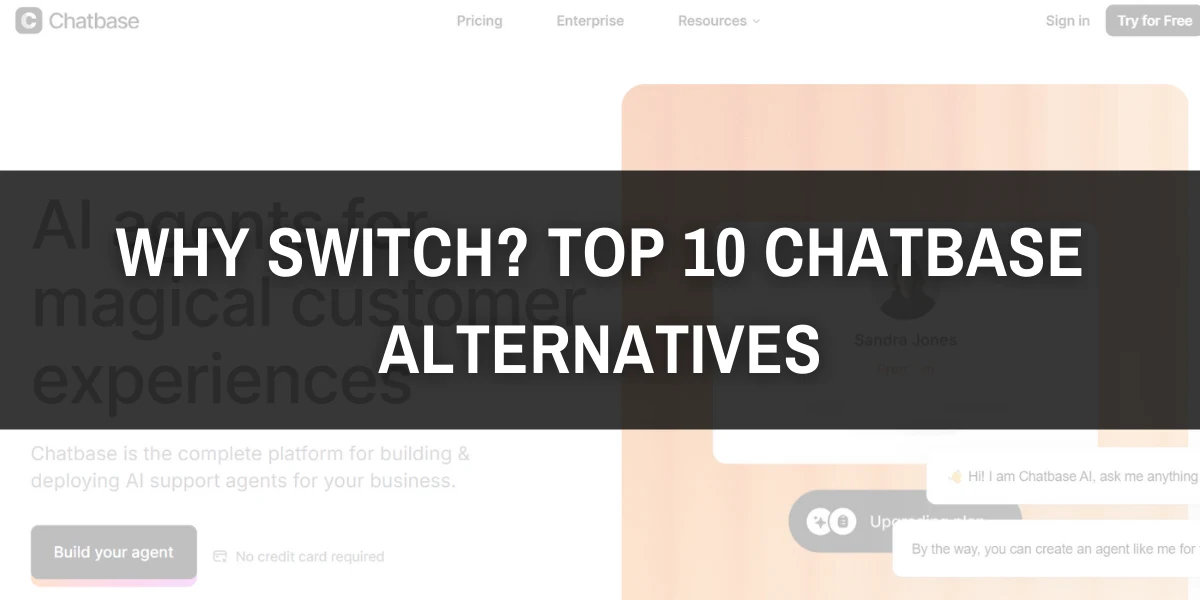
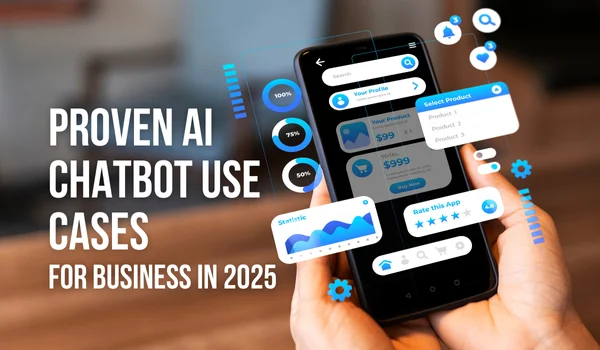

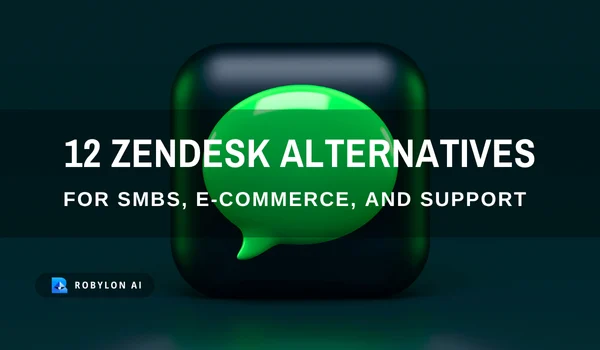
.webp)
